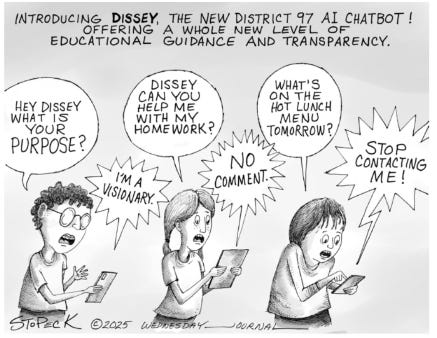Transparency, schmansparency
This week, my community's been reminded of one of the consequences of local journalism's declining presence and power: a lack of accountability among government bodies.
Is there anything more metaphorical than a faded “Circulation” on an awning of a former newspaper building that’s been gathering dust since its closure nearly 15 years ago?
This was my thought yesterday as I swung by my workplace through most of the 1990s. I always try to make a trek past 300 Lake Street in Elgin when I am in the area; each time, it's just more decay at what stood for 54 years as The Courier News building until its December 2010 closure.
I am never surprised, always saddened.
A failure to adapt in so many ways over the past few decades has sapped local journalism’s presence and power. Fading circulation—captured poignantly by that faded signage on the edge of 300 Lake—has led to news deserts. In those areas, there’s no local “fourth estate” to counterbalance abuses of the executive, legislative and judicial branches of government.
My old newspaper’s spiral is just one snapshot among so many others nationally, speaking to the erosion of local journalism. With that erosion has come the loss of so much, particularly accountability for government bodies.

I covered local government as a reporter for over 20 years. Later, I served a pair of four-year terms on local public boards—one library and one high school board. Through those experiences, I can attest to two overriding truths about elected officials:
They are fond, to the point of cliché, of emphasizing how much they value transparency.
When the rubber meets the road and the time comes to be transparent, they too often do a complete 180-degree pivot.
Transparency, schmansparency.
Case in point: a little over a week ago, the superintendent for our K-8th grade schools, Ushma Shah, abruptly resigned in my community of Oak Park, Illinois. This came only a few months after a two-year contract extension and just as the school year was starting.
The school district’s response: delay disclosing this news for three days—a classic late Friday afternoon “news dump”—and then batten down the hatches. When a reporter tried to get more than a “no comment” beyond a carefully worded and sanitized statement that sparked more questions than gave answers, board president Cheree Moore essentially said to stop contacting her, according to news reports.
In contrast, here’s how Moore responded as a candidate when she first ran for the board in 2019, to the question: “What does transparency in government mean to you? How would you put it into practice?”
“To me, transparency means that not only are we making information available, but we are making it available in a variety of ways, in a manner that is easily understood and in a timely fashion…(being) active and accessible in the community builds trust so that people feel that you are being as transparent as possible.”
Words, words, words.
When the eventual release of more details indicated tension between Shah and the school board, Chicago Tribune reporter Bob Skolnik1 asked for e-mail communication spanning the three days between the last school board meeting and Shah’s resignation.
“District 97 refused to provide copies of emails sent by and to Shah in her final three days on the job in response to a public records request, saying that the request was unduly burdensome,” wrote Skolnik.
To be clear: this was not for a few months or a few years of e-mails. It was for just a few days. If it’s genuinely a burden, then this is a much bigger story. How much back-and-forth was there before the resignation? Dozens of e-mails? Hundreds?
No, the truly unduly burdensome task these days is on journalism outlets trying to hold government bodies to account. That’s one reason why it’s so important for journalists to develop a variety of trusted sources who can provide a depth and breadth of insight, well before a crisis happens—to minimize the chance that they will be stonewalled when official channels dry up.
Are reporters taking that kind of initiative these days? Broadly speaking, it seems to be on a marked decline.
Neither left, nor right
This is neither a politically left nor right issue — when it comes to shielding the public from what should be publicly available information, neither end of the political spectrum is a paragon of virtue. President Barack Obama’s administration was notorious in this regard:
From PBS: Obama administration sets new record withholding FOIA requests
From the Poynter Institute: Obama administration sets record for unfulfilled FOIA requests
On a more hopeful note: I’m proud that my alma mater is a key force in the fight to support local journalism: the Medill Local News Initiative.
Dance Break
In the middle of a heavy day, my wife likes to take dance breaks. And this column is feeling rather heavy.
So, let’s pivot to Billy Joel. On the heels of my binge on his music about a month ago, some of his songs have been earworms for me, including “Allentown” and “Scenes from an Italian Restaurant.”
“Brenda and Eddie” certainly have been taking up a lot of head space!
There are worse earworm fates: a few months ago, I couldn't get REO Speedwagon out of my head after an ill-advised dalliance with their hits. Did you know that one of the band's albums was called You Can Tune a Piano, but You Can't Tuna Fish?
That takes some serious chutzpah.
Apparently, it's an old Groucho Marx joke, shared after an Assembly Hall gig in Champaign, Illinois by a friend of the band nicknamed Pineapple. Details are in the video below.
Cruise Control Quiz
Adaptive cruise control is one of the coolest innovations ever. I am fast approaching 32,000 miles in my two-year-old car and I would venture that at least 25% of that distance has come without me putting my foot on the accelerator.
I just set the speed and keep the foot in the vicinity as a precaution. Otherwise, the Tucson simply accelerates or decelerates, as dictated by the vehicle's pace in front of me. To adjust the speed, I just tap a button up or down.
It's not why I use the feature, but one perk is that I get a modest discount on my car insurance as long as I don't go over 80 miles per hour…and cruise control makes it a snap to stay below that threshold.
Meatballs
A few nights ago, Kyle Schwarber of the Philadelphia Phillies became the 21st Major League Baseball player to hit four home runs in a game. He did it off three pitchers; then, in his final at bat, he came up with a chance to shatter the record.
On the mound was a position player, Vidal Bruján, just lobbing the ball in at around 50 mph—barely half the speed of most legitimate big-league pitches and slow enough that even I could hit it. In short, he was throwing “meatballs.”
Mercifully, Schwarber popped out on a 57 miles-per-hour lollipop. As much as I like the former Chicago Cub slugger, I’m glad he didn’t break the record in this way. The mark would have been tainted.
The scenario highlights a bothersome trend where managers, when getting blown out of a game—this one was 19-4—are too often resorting to this mockery of competitive effort. This year, it’s happening nearly five times more often than in 2016.
Think of it this way: in hockey, does a left winger suddenly start playing goalie? In football, do the center and quarterback switch positions? In basketball, does the smallest guy in the lineup go up against the other team’s tallest?
No, no and of course not. Baseball can and should do better.
Bob is an Inside Edge subscriber and, at least locally, one of those refreshingly rare reporters who consistently goes beyond the surface and “official version” on stories.





1. Obama used the Espionage Act against journalists more than any prior President.
2. It's not just our elected official that must be held to account. Equally important are the unaccountable bureaucrats in the vast administrative state. For instance, Dr David Morens, senior advisor to Dr. Anthony Fauci, actually instructing his colleagues how to avoid FOIAs and mislead the people's representatives. I mean here is a man, whose salary was paid by the taxpayer, and he felt no obligation to the very people who employed him.
3. And of course the total gullibility and lack of interest of the legacy press when the first hint of the "Lab Leak" arose. I remember. I was up close and personal with the virus. And I bought into the lie that the "Lab Leak" was a mere right wing conspiracy. End of story. Nothing to see here. Total abrogation of curiosity and journalistic standards in the biggest health care catastrophe in my lifetime. Rather than acting as the valued fourth estate, the legacy press acted as a government spokesperson. When The Proximal Origin of SARS-CoV-2 was published in Nature Medicine 2020, not a ONE f'n question from the journalists in the legacy press. Cricketts. Absolute disgrace, IMHO.
4. But it's not just big government (or even small) that need watching. Hey if it wasn't for the investigative journalism of the WSJ, Elizabeth Holmes - deified by the NY Times by the way - and her make believe Theranos Co. may have caused untold harm to tens of thousands of people.
5. I recognize that investigative journalism as exemplified by the above WSJ investigation of Theranos is very very expensive and fraught with potential litigation concerns, but the decline in journalism of you speak, in part, was brought upon by themselves.
The news business has become too politically skewed and that is finishing off what the Internet began. Smaller audiences resulted in coverage geared to keep the remaining engaged. Not too sure how some places stay in business. You can see it most all of the old newspapers. No diagrams, avoiding many topics, no columnists to speak of and poor coverage of anything other than what comes in on the wire. Can't say it'd have turned out any differently as the Internet has become an equal opportunity job killer.
Regarding adaptive cruise, I like it for the adjusting to other autos and I hate mine because it reads speed signs and changes the speed that it is ultimately set for. On the open highway, I don't need that. I can figure that out on my own.